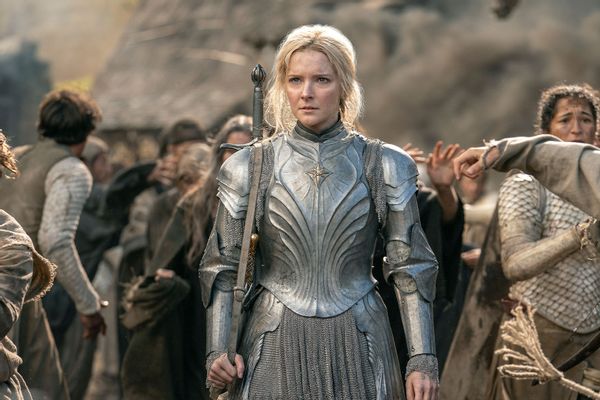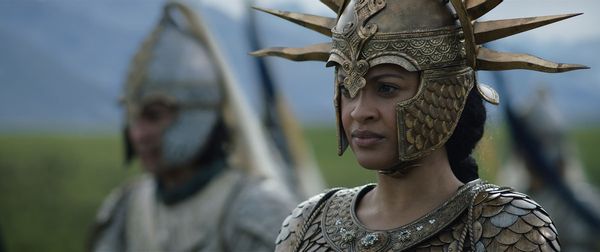
In the Season 1 finale of "The Rings of Power," we get a shot of those legendary rings, an image that dissolves creepily into the iris of the man who maybe/probably is Sauron, looking over his new volcano kingdom. And we get a song. Above the crashes of thunder and magna rumblings of Mordor, a known but unexpected voice cuts through.
The words may sound familiar. So does the voice. But it's their pairing that is the most extrordinary and surprisingly, fitting. It's a poem about the rings written by J.R.R. Tolkien himself and set to music by the series' composer Bear McCreary. And it's Fiona Apple who sings the closing song for the Prime Video show, a match that makes even more sense than an elf lord and dwarf prince being best friends forever. Because Apple? She wanted this all along.
Apple, the creator of five albums, all of which have reached the top 20 in the U.S. Billboard 200 chart, has publicly credited poet Maya Angelou as her biggest inspiration. The singer songwriter, a three-time Grammy Award winner, was brought to musical composition through poetry. As Apple told Pitchfork in 2020, "My singing self was born out of singing Maya Angelou poems to myself at night going to sleep."
While it's not known if Apple, who says in the same interview she owns 15 copies of "The Cambridge Encyclopedia of Language," is specifically a Tolkien fan, it wouldn't be out of the (magical) realm of possibility. Apple is bookish, relating in the Pitchfork interview, "When I come across poetry that gets me, it gets me, and I love the idea of a poem, of all of the power that can go into a space between two words or a repetition of one word, these tiny things that can mean so much and feel so huge." Her songs are intellectual; as American Songwriter puts it, "Apple writes in her own elevated vocabulary . . . throw[ing] around multisyllabic words like she just finished studying for the SATs. She's a rock and roll thesaurus, whose love of language transfers to her album titles." Who can forget Apple's 1999 album "When the Pawn . . ." Well, you might forget the title in its entirety as its full name was once placed in the "Guinness Book of World Records" in 2001 for longest title (but has since been dethroned).
You learn things listening to Apple, new words, words like "undulate" (that was new to me as a teen with her first album, anyway), "rigadoon" and how to mold that weighty language, to work the words like precious metals around her sound.
So much of this positing was based on Apple's appearance and small stature, and not about her actual work.
But Apple's connection to "The Rings of Power" is more than wordsmithery. When Apple burst onto the scene with "Tidal," she was 17, with some of the album's songs written when she was 15. The daughter of musicians and performers, she was also a survivor of childhood rape, an experience that resulted in disordered eating. She said to Rolling Stone, "For me, it wasn't about getting thin, it was about getting rid of the bait that was attached to my body. A lot of it came from the self-loathing that came from being raped at the point of developing my voluptuousness . . . I just thought that if you had a body and if you had anything on you that could be grabbed, it would be grabbed. So I did purposely get rid of it."
From the beginning, Apple was marketed a certain way: as a waif, young and weak. The New York Times described her in 1997 as "like a cross between Christy Turlington and Kate Moss," the later of whom had helped popularize, intentionally or not, the so-called "heroin chic" look of pale skin, stringy hair, thinness and dark eye circles. As The Washington Post wrote in 1999, magazines at the time presented Apple as "a flaky and/or neurotic new-waif rocker — 'Kate Moss with songs,' Q suggested." So much of this positing was based on Apple's appearance and small stature, and not about her actual work, which was and is powerful, soaring and fiercely brave. She has a throaty voice, a deep and dark one, and her songs sing of wars waged.

fiona apple in a full suit of armor on the subway photographed by joe mcnally in 1997 pic.twitter.com/po4gf9jp4x
— ☆ 𝔤𝔲𝔰𝔰𝔶 (@gusfenty) April 23, 2020
The show has reclaimed Galadriel, reinventing her from the mystic, yes waifish goddess of "Lord of the Rings."
It's not only that "The Rings of Power" is set in a high fantasy world of knights, sea worms and singing dwarves, it's that the prequel consistently highlights the achievement and strength of women. The show has reclaimed Galadriel, reinventing her from the mystic, yes waifish goddess of "Lord of the Rings" to the army commander we see in this series who consistently saves the day, does the noble feat, makes the hard call. Galadriel often pays the price for being a warrior and rational leader who happens to be female, including dealing with distrust and outright violence from men, and believing too much in the goodness of another, admittedly mediocre, character.

In an interview with Radio Times, "The Rings of Power" showrunner Patrick McKay describes the closing song with Apple's involvement as "like a crazy dream come true." But the song does more than sound lovely and be fitting. According to McKay, it also points the way forward, with a second season of the show slated to focus more on the rings themselves, and how and why they keep growing. It can't be easy wearing heavy armor — on the subway, on stage, in Middle-earth — and the weighty mantle of being strong in the face of flames is not a light burden. But both Galadriel and Apple keep standing.







